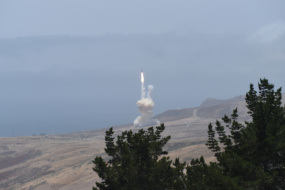New weapons that threaten assets in space aren’t just a response to the recent success of the space industry, or an opportunity to win government contracts—they’re also a threat to the way business is done in orbit.
Primary source: Annual open-source reports from the Secure World Foundation and the Center for Strategic and International Studies released this month detail the development of weapons that can threaten assets in space, from electronic warfare to kinetic weapons.
The number of countries included in the report has doubled since it was first published in 2018. This year’s roundup of 12 countries includes Israel for the first time after it performed the first space-based interception of a ballistic missile fired from Yemen.
“Every military is planning to either disrupt [Global Navigation Satellite Systems] in a conflict or operate without it in a conflict,” SWF’s Brian Weeden said. “I’m not sure that civilian commercial users are ready for that.”
Duel use: Commercial satellite operators used by the US military and its allies for communications and reconnaissance have been targets for hacking, jamming, and spoofing, particularly by Russia during the conflict in Ukraine. The military wants more commercial capability, not less, but it’s still not clear what happens if private assets are damaged in a conflict.
“Even though it’s become more obvious, this is not new,” SWF’s Victoria Samson said at a panel on the reports yesterday, noting that commercial satellites provided the vast majority of DoD comms during the conflict in Afghanistan. “We should have solved it by now.”
The DoD’s first commercial space integration strategy released this month addresses the issue, with the Pentagon committing to “evaluate gaps in protection from commercial insurance providers, the conditions under which US government-provided insurance would be needed for the space domain, and whether those conditions have been met.”
And even spacecraft without military contracts could be at risk. “I don’t think Russia or China are going to distinguish [an American-flagged spacecraft] from…a capability that the US would use in a conflict,” CSIS’s Clayton Swope said.
That Russian space weapon: Plans for a potentially nuclear-powered Russian space weapon on orbit have captured the attention of military space watchers, but we don’t know much about it. Since it’s possible to detonate a nuclear weapon in orbit with just an ICBM, Swope speculated it makes more sense for the new vehicle to focus on electronic warfare.
“One potential rationale: this is somehow a response to the rise of proliferated constellations,” Weeden says. Distributed satellite networks make individually-targeted kinetic weapons less of a threat, but create an incentive for wide-field weaponry (such as a nuclear-triggered EMP in orbit). Such a capability would threaten not only enemies but also Russia’s own satellites—and those of its allies.
“China…is building up a huge amount of space infrastructure—commercial, civil and national security,” Weeden pointed out. “I would love to know what sort of back channel discussions go on between the Chinese government and the Russian government.”
Open the kimono. As is traditional for open-source analysts and top commands in the Space Force itself, the researchers noted that the high classification of military space programs can become counter-productive.
“I don’t know how we can effectively deter an adversary from doing something in space…if the adversary doesn’t quite know what we’re going to do,” Swope said.




